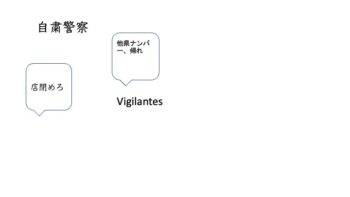Today’s Japan: Living with Karen Posted by eriko1 on Feb 12, 2021 in Culture
In the US, 2020 is called the year of Karen. According to Wiki, “Karen is a pejorative term for women seeming to be entitled or demanding beyond the scope of what is normal. “ A bit different from “Karen” is the Japanese 自粛警察or jishuku keisatsu. Jishuku keisatsu means “police who monitor if people are practicing self-imposed restraints.” As a matter of fact, 自粛警察 was one of the most popular words in 2020.
On January 7, 2021, Japan declared (宣言するsengensuru) a state of emergency (非常事態hijojitai) in Tokyo and three surrounding prefectures for the second time. However, the declaration relies mostly on voluntary (自発的な jihatutekina) compliance (従うことshitagaukoto) as the past national experience had led the nation into war. So the government can only suggest strongly not to do this or that. Some take this as orders (命令meirei), while others take it as strong suggestions. The latter (後者 kousha) goes out for a drink or two or three. While some people in the former (前者 zensha) become 自粛警察 trying to control the latter group with their own sense of justice (正義 seigi).
自粛警察 use posts and letters to threaten (脅すodosu) some business owners anonymously as seen in the video news here.
For the Japanese, rules (規則ルール kisoku, ru-ru) are not grey but black and white. It contradicts (矛盾するmujunsuru) their importance of ambiguity (曖昧さ aimaisa) to avoid (避けるsakeru) conflicts (対立tairitsu) and uncomfortable feelings. Rules are clear. Rules make it easy to live because you do not have to think. But you lose the ability to think. Here is an interesting case when considering what rules mean to the Japanese.
The most recent declaration of a state of emergency in January in Tokyo requested restaurants to stop serving alcoholic beverages by 7 pm, and to close by 8 pm to prevent COVID-19 from spreading. As these were not orders, it was up to the restaurants and patrons whether to follow these suggestions. Many have decided to follow the suggestions. HOWEVER, another problem surfaced. People started to get together and started to have a party and to drink early. Out came a neologism (造語 zougo) – 昼飲み (day drinking, hirunomi). Is COVID-19 inactive until 8 pm?
By drinking during designated hours, nobody is violating (違反するihansuru) the suggested rules of not providing alcoholic beverages after 7 pm. So they are good, right? I understand the motivation of the restaurants’ side – they have to get as many patrons as possible to survive. But how about the customers’ side? They are not breaking the suggested rules, and many at various ages say, “let me have some relaxation!” They do not realize why these suggested rules have been created – the basis of the government thinking is that people tend to get very loud when drunk, and tend to spread droplets (飛沫 himatsu). Later, the government officials had to hold press conferences (記者会見 kasha kaiken) to say that the COVID-19 was active also during the day so please try not to have parties during the day. Duh… Have the Japanese lost the ability to think?
However, things are pretty different in this 2ndstate of emergency. There are fewer 自粛警察 at least on the surface. Japan is a society that values unity (統一性 touitsusei). That sounds great, but that is the main source for 自粛警察. If you do not do what others do, then you are violating unity, and you are a problem. People are so tired of COVID that more people have started to defy (逆らう sakarau) the “strong suggestions.” So 自粛警察 maybe feeling powerless and lonely?
 Also, the inability to enforce orders by the government was another source to give rise to 自粛警察. However, enforceability (強制力 kyoseiryoku) was added to the declaration of a state of emergency on February 3, 2021– “Japan’s parliament on Wednesday enacted laws that will introduce fines for people and businesses that do not comply with restrictions imposed to prevent the spread of the novel coronavirus.” (kyodonews.com) So more concrete and clearer “orders” from the government discouraged 自粛警察 to spread their own interpretation of justice.
Also, the inability to enforce orders by the government was another source to give rise to 自粛警察. However, enforceability (強制力 kyoseiryoku) was added to the declaration of a state of emergency on February 3, 2021– “Japan’s parliament on Wednesday enacted laws that will introduce fines for people and businesses that do not comply with restrictions imposed to prevent the spread of the novel coronavirus.” (kyodonews.com) So more concrete and clearer “orders” from the government discouraged 自粛警察 to spread their own interpretation of justice.
Read this descriptive blog about 自粛警察 https://ameblo.jp/haruharuko3/entry-12603795933.html
Japanese people have not experienced so-called “lockdown”. During the first declaration of a state of emergency, they did experience a taste of “lockdown.” But after the first declaration was removed on May 25, 2020, their lives have been much closer to normal than those in the US. It is amazing to me that they are complaining how their freedom has been taken away while they can dine at restaurants before 8 pm, schools are fully open except for the higher education, and events with a capacity of less than 5000 or 50% of the capacity can be held.
COVID-19 has surfaced many problems and weaknesses of the Japanese society, and how the society has been changing and not changing is evidenced by the recent Tokyo 2020 Olympics President Mori’s SNAFU, which I would like to write about next time.

Build vocabulary, practice pronunciation, and more with Transparent Language Online. Available anytime, anywhere, on any device.




Comments:
Malcolm Cross:
Insightful and helpful article. Thank you for writing it and I look forward to your next article.
eriko1:
@Malcolm Cross Thank you very much, Malcolm! I just watched on the news today that there was 自炊警察、imposing people to cook at home instead of buying dinner.